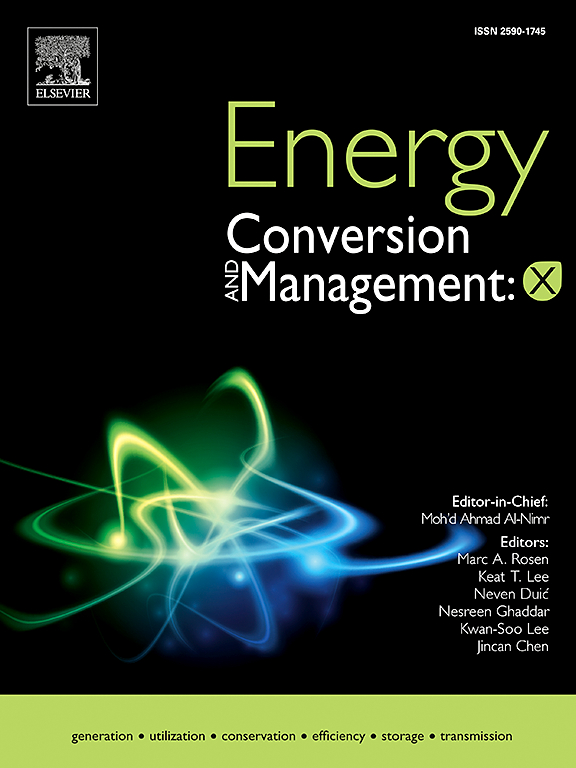Optimal distributed generation allocation in radial distribution networks using a modified seagull optimization algorithm with elite reserve strategy
IF 7.6
Q1 ENERGY & FUELS
引用次数: 0
Abstract
Reconstructing radial distribution networks (RDNs) by integrating distributed generation (DG) is essential for enhancing the sustainability, reliability, and flexibility of power supply, thereby improving renewable energy utilization. This paper investigates the optimal distributed generation allocation (ODGA) problem, which involves both discrete (DG location) and continuous (DG capacity and power factor) decision variables and exhibits high non-convexity and computational complexity. To address these challenges, a single-objective modified seagull optimization algorithm (mSOA-SO) is proposed, incorporating an elite reserve strategy with access location guidance (ALG) and effective re-migration (ERM) into the base algorithm. Experimental results demonstrate that mSOA-SO achieves active power loss reductions of 93.96 %, 98.11 %, and 63.18 % on the IEEE 33-, 69-, and 119-node RDNs, respectively, by optimally integrating DGs with controllable power factors. To extend the method for practical multi-objective ODGA scenarios, this paper further develops a multi-objective modified seagull optimization algorithm (mSOA-MO) through the integration of an innovative multi-level performance evaluation (MLPE) strategy. Notably, mSOA-MO identifies superior DG schemes for both dual- and triple-objective ODGA problems, effectively reducing voltage deviation, active and reactive power loss in RDNs. Thus, the proposed mSOA-SO and mSOA-MO effectively identify advantageous DG allocation schemes, serving as robust techniques for the secure integration of renewable energy into RDNs. This study emphasizes the crucial role of intelligent algorithms in energy management and enhancing the environmental benefits of energy supply.
基于精英储备策略的改进海鸥优化算法的径向配电网分布式发电优化分配
通过集成分布式发电(DG)对径向配电网进行改造,是提高供电的可持续性、可靠性和灵活性,从而提高可再生能源利用率的必要手段。本文研究了分布式发电最优分配(ODGA)问题,该问题既涉及离散(DG位置)决策变量,也涉及连续(DG容量和功率因数)决策变量,具有较高的非凸性和计算复杂度。为了解决这些问题,提出了一种单目标改进海鸥优化算法(mSOA-SO),该算法在基本算法中加入了具有访问位置引导(ALG)和有效再迁移(ERM)的精英储备策略。实验结果表明,mSOA-SO通过优化集成具有可控功率因数的dg,在IEEE 33、69和119节点rdn上分别实现了93.96%、98.11%和63.18%的有功损耗降低。为了将该方法扩展到实际的多目标ODGA场景,本文通过集成创新的多层次性能评估(MLPE)策略,进一步开发了一种多目标改进海鸥优化算法(mSOA-MO)。值得注意的是,mSOA-MO为双目标和三目标ODGA问题确定了优越的DG方案,有效地降低了rdn中的电压偏差、有功和无功损耗。因此,所提出的mSOA-SO和mSOA-MO有效地识别了有利的DG分配方案,为可再生能源安全集成到rdn中提供了强大的技术。本研究强调了智能算法在能源管理和提高能源供应环境效益中的重要作用。
本文章由计算机程序翻译,如有差异,请以英文原文为准。
求助全文
约1分钟内获得全文
求助全文
来源期刊

Energy Conversion and Management-X
Multiple-
CiteScore
8.80
自引率
3.20%
发文量
180
审稿时长
58 days
期刊介绍:
Energy Conversion and Management: X is the open access extension of the reputable journal Energy Conversion and Management, serving as a platform for interdisciplinary research on a wide array of critical energy subjects. The journal is dedicated to publishing original contributions and in-depth technical review articles that present groundbreaking research on topics spanning energy generation, utilization, conversion, storage, transmission, conservation, management, and sustainability.
The scope of Energy Conversion and Management: X encompasses various forms of energy, including mechanical, thermal, nuclear, chemical, electromagnetic, magnetic, and electric energy. It addresses all known energy resources, highlighting both conventional sources like fossil fuels and nuclear power, as well as renewable resources such as solar, biomass, hydro, wind, geothermal, and ocean energy.
 求助内容:
求助内容: 应助结果提醒方式:
应助结果提醒方式:


